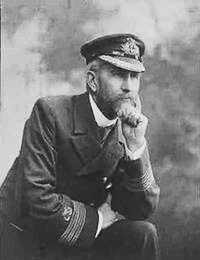Captain Chapman James Clare

By HJ Zwillenberg
Chapman James Clare (1853-1940), naval captain, was born on 23 June 1853 in the Bay of Biscay on the Matilda Wattenbach, his father was James Coughron Clare, master of the ship. Educated at Cheshunt and Edmonton in England, at 15 he began a merchant marine apprenticeship with Smith, Fleming & Co of London, and worked on sailing ships until 1873 when he became a mate on a steamer of the Belgian Royal Mail Line.
In 1875-80 Clare served on the opium steamers of Apcar & Co, Calcutta, trading between Hong Kong and Calcutta. Resigning in 1880, he came to South Australia where on 15 June he joined the Marine Board. Four years later he was given command of the steamer Governor Musgrave which was used to service lighthouse installations and navigational aids along the coast. He married Ellen Minnie Cotgrave at Semaphore on 5 April 1885, they had two sons and a daughter.
After a period in the colony's naval reserve Clare was commissioned as a Lieutenant Commander in the South Australian Naval Forces on 1 December 1886. He remained nominally in charge of the Governor Musgrave until 1900, although he was often involved with naval reserve training and other duties in the cruiser HMCS Protector. He was promoted Commander in May 1900, was transferred to Protector, and in July was appointed Naval Commandant in succession to Captain WR Creswell [q.v.].
In December he was promoted Captain and from 1901 was second in seniority in the Commonwealth Naval Forces. During the Boxer Rebellion the South Australian Government offered the British Government Protector, it was accepted on condition that it be commanded by an officer of the Royal Navy. This problem was overcome by Clare agreeing to serve as Executive Officer under the command of Creswell [q.v.] who had served in the Royal Navy. For his services during the rebellion Clare was appointed CMG in 1902 and from then until 1910 commanded the Protector in home waters.
On the formation of the Royal Australian Navy in 1911, Clare became District Naval Officer in Western Australia. During World War I he was awarded the Japanese Order of the Rising Sun in recognition of his association with the Japanese Navy, then engaged in convoying Australian troops to Europe. He returned to South Australia in 1918 and was District Naval Officer until he retired in July 1919.
In retirement Clare lived at Glenelg, Adelaide. Survived by his wife and children, he died there on 28 September 1940 and was cremated.


